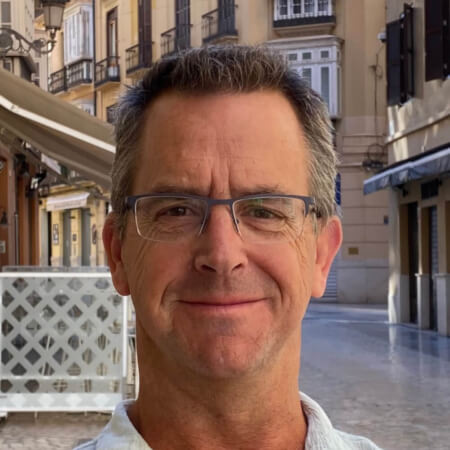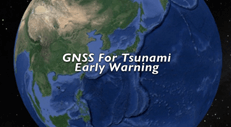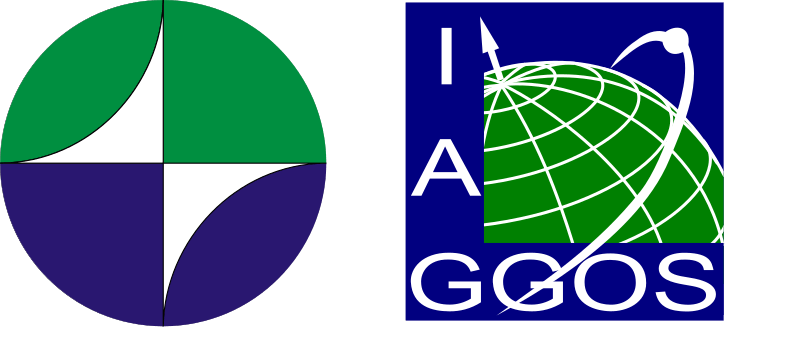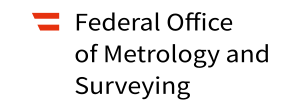GGOS Focus Area
Geohazards Monitoring
The GGOS Geohazards Monitoring Focus Area seeks to accelerate and guide the acceptance of new geodetic capability to improve resilience to environmental hazards. The Focus Area establishes working groups comprised of GGOS members and the responsible agencies of participating nations. The Focus Area encourages the sharing of intellectual, financial and physical resources as recommended by the UN-GGIM.
GNSS for Tsunami Early Warning
The Geohazards Monitoring Focus Area is focussed on the GNSS enhancement of Tsunami Early Warning Systems (GTEWS) as recommended by Resolution #4 of the 2015 IUGG General Assembly and further illuminated by the General Assembly’s Resolutions #6 and #7 that emphasize the importance of international scientific cooperation in meeting the challenge of geohazards. The focus upon GTEWS builds upon the GGOS vision document recommendation #5.8 that calls upon us to “promote the development of GNSS seismology particularly for early warning and disaster assessment”.

Tim Melbourne
Tsunami detection by GNSS caused by Tohoku earthquake – GTEWS (GNSS enhancement of Tsunami Early Warning Systems)
GNSS-Enhanced Tsunami Early Warning Topic Group of ITU Focus Group on AI for Natural Disaster Management
Status report of GGOS Focus Area Geohazards at GGOS Days 2023 (September, 2023)
The importance of GTEWS was amply defined in the powerful Tohoku oki earthquake and tsunami recorded by one of the world’s most advanced GNSS ground networks, the Japanese GEONET. The Geodetic and Geohazards community studied the data extensively and concluded that the GNSS could have provided an accurate early warning within five minutes of the Tohoku oki earthquake’s onset. The same GNSS capability could have provided verification of the tsunami scale and begin to track its propagation before the inundation of the nearest coastal community. GTEWS could provide authorities significant time to warn the local communities with far fewer false alarms. This information was provided by the GGOS co-sponsored GTEWS 2017 workshop reports. The GTEWS 2017 workshop reports are published by the Association of Pacific Rim Universities (APRU) and following peer review by the UN Office for Disaster Risk Reduction (UNDRR) as a contributing paper to the Global Assessment Report for 2019 (GAR19).
GATEW Working Group
As its first initiative, the GGOS Geohazards Monitoring Focus Area initiated and established a working group for the GNSS Augmentation of Tsunami Early Warning (GATEW) for the implementation of the GTEWS initiative in 2016. The GATEW Working Group was formed by a Call for Participation issued by GGOS Chair Kutterer. The GGOS Call for Participation in the GATEW working group remains open to all agencies and institutions that can provide resources and knowledge for the advancement of its GTEWS initiative. The GATEW Working Group currently numbers 18 exceptional institutions from 12 nations. The GATEW members were central to the success of the GTEWS 2017 meeting its report and the unfolding implementation of GTEWS.
Further Steps
The COVID-19 health and economic crisis is impacting the Geohazards Focus Area. The Focus Area had announced a group meeting GTEWS 2020 as a sequel to GTEWS 2017 in collaboration with the IUGG, APRU, Tohoku University, U. California-Davis. The meeting is now postponed due to the challenges of travel due to the pandemic and its aftermath.
Given this delay, the Geohazards Focus Area determined that it is best to move forward with the first recommendation of the GTEWS 2017 workshop i.e., the establishment of a consortium to oversee the development and operation of a GNSS Tsunami Early Warning capability for the Indo-Pacific and Caribbean Basins. The IUGG is making starter funds to support the planning of a meeting of principal organizations to develop a GTEWS Consortium to encourage the shared access to real time multi-GNSS data and processing software within cloud computing environment.
The concept of a meeting of principals to discuss the GTEWS Consortium has been endorsed by the GGOS Coordinating Board, the IAG President, the IUGG Commission on Geophysical Risk and Sustainability (GRC) . The Geohazards Focus Area is working with the GRC and the Geodesy4Sendai activity of the Group on Earth Observations (GEO) to develop support and resources to assemble a consortium of principal organizations for the formation of the GTEWS Consortium. We believe that the members of the GATEW working group will play an essential role within the GTEWS Consortium.
During the coming months, the GATEW Working Group will conduct virtual meetings of small subgroups to discuss support for GTEWS Consortium its goals, strategies and timelines and membership composition including those government agencies responsible for the disaster risk management. The Focus Area will recommend that the findings and recommendations of the GTEWS 2017 workshop serve as the foundation for the GTEWS Consortium. Furthermore, the GTEWS Consortium will likely require;
- National government participation for access to real time data
- Participation of national emergency response agencies to insure proper interface and support.
- Broadband communications secure during disaster response
- Cloud computing support
- Science and technology readiness
(last update 11/2020)




